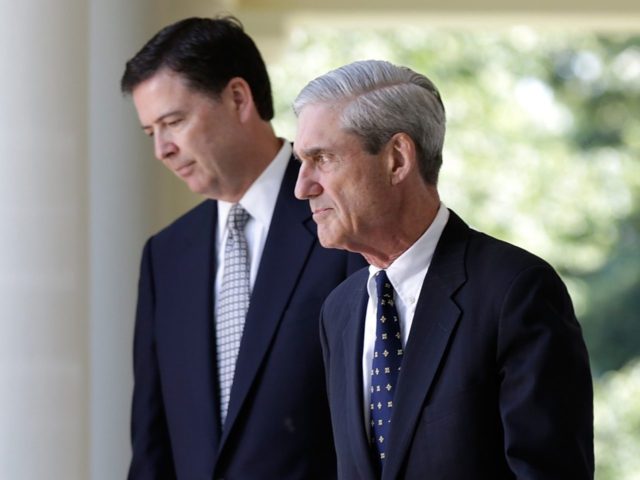The report of Department of Justice Inspector General Michael Horowitz undermines the basis for Special Counsel Robert Mueller’s investigation, because its conclusions suggest President Donald Trump was not obstructing justice in firing former FBI director James Comey.
The report, released Tuesday, concludes that former Comey was insubordinate in his handling of the investigation into Hillary Clinton’s emails. That echoes the reasons given by Deputy Attorney General Rod Rosenstein in his memorandum to the president last year recommending that Comey be dismissed, which he was.
If President Trump had not fired Comey last May, he would have to do so today. And he would have to do so even though he is now under investigation — which he was not when he fired Comey. (Indeed, one reason he fired him was Comey’s refusal to say publicly what he had told Trump privately: namely, that he was not under investigation.)
If firing the FBI director was obstruction of justice when Trump was not under investigation, then it would certainly be obstruction of justice when he is so.
And yet no one could argue reasonably that the president should retain an FBI director who had been insubordinate, arrogating powers to himself that he simply does not have. (Even if the president handed Comey’s fate to another official, ultimately he would be responsible for the firing.)
Two other facts are relevant. One is that it was Comey’s firing, not any particular evidence of Russian collusion, that triggered the appointment of a Special Counsel — and it was Comey who triggered it by leaking memoranda of his conversations with the president. He clearly intended to place Trump under suspicion of obstructing justice.
The other fact is that there is still no evidence of collusion with Russia, nor of any crimes undertaken with that intent.
So the Special Counsel’s investigation has no foundation and no reason to continue.
Yes, he has achieved convictions, and is prosecuting former Trump campaign manager Paul Manafort. But the charges against Manafort have to do with conduct prior to the campaign. Even those convicted of lying to the FBI did so before the Special Counsel was appointed. There is no reason for such investigations to be conducted outside the normal Department of Justice process.
Mueller wants to interview Trump. There is no longer any reason for Trump to agree.
If it would not be obstruction of justice to fire Comey in June 2018, it was not obstruction of justice for him to do so in May 2017 on Rosenstein’s recommendation.
Whatever Trump felt about the FBI’s investigations into Russia, he knew that he himself was not under investigation, and he did not interfere in investigations of others. Indeed, he encouraged the FBI to continue.
There is also a constitutional case to be made that Mueller’s appointment was itself unconstitutional. As radio host Mark Levin explained recently on Hannity, the revelation that prosecutors working for Mueller had been deputized as Assistant U.S. Attorneys meant that Mueller himself was performing as a U.S. Attorney.
That is a principal office of the executive branch, requiring Senate confirmation — which, of course, Mueller did not receive (and would not).
There are other problems, too — such as the bizarre fact that Rosenstein is overseeing the investigation while he is also a witness, and the many conflicts of interest between Muller, Comey, and Rosenstein.
But all of that may be moot. The Inspector General’s report leaves no doubt that Comey had to be fired. Indeed, the president would have violated his oath of office had he not fired Comey. And with Russia turning out a red herring, it is time for Mueller to stop.
Joel B. Pollak is Senior Editor-at-Large at Breitbart News. He was named to Forward’s 50 “most influential” Jews in 2017. He is the co-author of How Trump Won: The Inside Story of a Revolution, which is available from Regnery. Follow him on Twitter at @joelpollak.

COMMENTS
Please let us know if you're having issues with commenting.